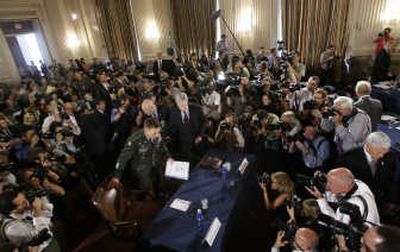Hearing tests patience on all sides

WASHINGTON – The chairman called it the most important hearing of the year. The president touted it for months. But when the moment finally came for the top commander in Iraq – with his four stars and nine rows of ribbons – to tell the world how the war was going, the microphone broke.
Probably not the picture Congress wanted to portray to a skeptical nation. If Washington can’t conduct a hearing, how can it conduct a war?
“Somebody please fix the mike. Are we fixed yet? Come on!” Rep. Ike Skelton, D-Mo., chairman of the House Armed Services Committee, boomed. His mike was working fine.
When the sound finally came on Monday, Gen. David Petraeus proceeded to read his progress report while lawmakers paged through colorful charts that showed violence was down in Iraq. But it’s unclear whether the apparently irreconcilable sides of the debate over the war could hear each other.
Both inside the august hearing room and outside in the marbled halls, a lot of minds were made up and not budging.
“I expect Gen. Petraeus will present his cherry-picked numbers to indicate enough progress so the Bush administration can stay the course,” Rep. Janice Schakowsky, D-Ill., said, whipping out her own charts showing violence was down only if you didn’t count car bombs or bullets to the front of the head rather than the back.
Interest in the hearing was hot, likened to Gen. William Westmorland’s performance on Vietnam a generation ago. But some tempers were hotter. There weren’t enough seats. The acoustics were bad. The overflow room was two buildings away, and it was muggy outside. Clearly, a lot of people were sick of this war, and a lot of other people were sick of the people who were sick of this war.
They started lining up before 8 a.m. Two opposing factions standing in line for five hours with nothing to do is not a recipe for harmony.
Suddenly, there was a lot of scuffling and a clot of Capitol police coagulated in the hallway. In the middle was the anti-war activist Rev. Lennox Yearwood, who apparently had attempted to push his way into the hearing room and was wrestled to the floor.
Television cameras scurried to the scene. Yearwood was lying on the ground with his legs askew, as though he had been hit by a car. Seizing the moment, war protester Cindy Sheehan started chanting, “Arrest Bush, not Rev!” Police told her if she said that one more time, they would have to arrest her. She said it one more time and put her hands behind her back before the officer even reached for the cuffs.
It was clear from the start that shenanigans would not be tolerated, and Skelton promised disrupters would be prosecuted.
This was going to put a crimp in Liz Hourican’s plans. A member of the anti-war group Code Pink, she had her pink backpack stuffed with pink signs that said, “What a Crock!” which she planned to flash whenever U.S. Ambassador to Iraq Ryan Crocker said something she didn’t like, which she expected would happen a lot. Attached to her T-shirt was a piece of pink tape bearing the number 3,762 – the number of recorded U.S. troop deaths.
But leaning against the wall at the end of the hall was an equally committed Kathy Upton, wearing a “Give Victory a Chance” button. She had her shoes off. It had been a long morning.
“All of this ‘Support the troops, bring them home.’ These guys don’t want to come home. They want to finish the job,” she said, shaking her head at the protesters.
During a short break in the testimony, lawmakers spilled into the halls. Not much had changed.
The Republicans were impressed: “Unimpeachable integrity,” Rep. Paul D. Ryan, R-Wis., declared.
The Democrats were impatient: “It’s more punting further down the road,” Rep. Joseph Crowley, D-N.Y., said.
But, Schakowsky noted, there was one firm date bound to forge some kind of change.
“November 2008,” she said.